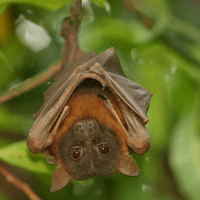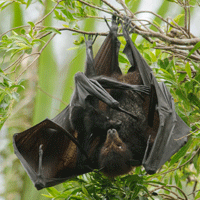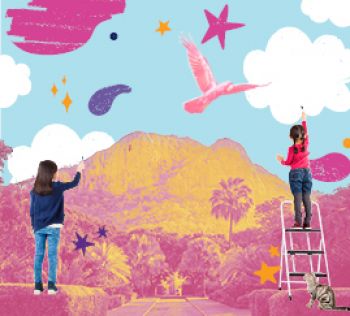Wildlife
It is important that when we are in nature and come across wildlife, we exercise caution. If you come across injured wildlife, contact Townsville’s local wildlife carers and rehabilitation organisations and let the experts assist.
Wildlife are often more scared of you than you are of them. Stand your distance and look but don’t touch, throw objects or scare our wildlife. Townsville has an abundance of species living in the wild.
Flying-Foxes
About Flying-Foxes
Flying-foxes are native to Australia and are protected under the Nature Conservation Act 1992.

Types of Flying-Foxes
There are two types of flying-foxes in Townsville:
Little red flying-fox (Pteropus scapulatus)
Little Red flying-foxes are the smaller of the two and mostly eat nectar. They visit Townsville as they travel up and down the east coast of Australia, kind of like “red nomads”. They come in small or very large groups and stay for a few months when their favourite nectar trees are flowering including in the highly valued Dan Gleeson Memorial Gardens.

Black flying-fox (Pteropus Alecto)
Black flying-foxes are permanent residents and the largest and the most common type in this area. They stay year round, but move from camp to camp. Black flying-foxes love to eat fruit, pollen and nectar.
Flying-Fox Camp Locations
There are 8 permanent and at least 12 temporary flying-fox camps around Townsville. Dan Gleeson Memorial Gardens and the Palmetum are known hot spots. The current camps can be seen on the National flying-fox monitoring viewer.
Flying-Fox Factsheets
Download a copy of our factsheets below.
- Flying-foxes: Get to know your neighbours (PDF, 243.2 KB)
- Flying-foxes: Heat stress (PDF, 1.7 MB)
Role of Local Government with Flying-Foxes
Flying-foxes have had an impact on residents and their properties. These nocturnal animals are attracted to flowering and fruiting trees in suburban areas, creating noise disturbances whilst most active during the night. Residents often wake up to messes, faeces, and unpleasant odours.
The Department of Environment, Science and Innovation (DESI) recognises the important role local governments continue to play in managing issues around flying-fox roosts in urban areas. Under the Nature Conservation Act 1992, local governments in Queensland have an as-of-right authority to undertake roost management at flying-fox roosts in designated Urban Flying-Fox Management Areas (UFFMAs).
Management activities are limited to non-lethal methods, and may only be undertaken in accordance with the Code of practice—Ecologically sustainable management of flying-fox roosts. The code of practice ensures acceptable welfare outcomes for flying-foxes.
Outside an UFFMA, Council requires a flying-fox roost management permit (FFRMP), available from the Department of the Environment, Tourism, Science and Innovation.
A non-Council applicant requires a FFRMP irrespective of the location of the roost. For further information please visit the Department of the Environment, Tourism, Science and Innovation website.
Legislation
The relevant sections of the legislation are:
- Nature Conservation Act 1992 – Part 5 Wildlife and habitat conservation. S.88C Restrictions relating to flying-foxes and flying-fox roosts.
- Code of Practice Ecologically sustainable management of flying-fox roosts. The code of practice ensures acceptable welfare outcomes for flying foxes.
- Activities affecting the spectacled flying-fox (Pteropus conspicillatus) and grey-headed flying-fox (Pteropus poliocephalus) may be subject to referral to the Commonwealth under the Environment Protection and Biodiversity Conservation Act 1999 (EPBC Act) in the event of likely significant impact.
- All persons are authorised to undertake low impact activities at roosts in accordance with the Code of practice—Low impact activities affecting flying-fox roosts - Low impact activities include weeding, mulching, mowing or minor tree trimming. Operating outside of the code of practice is not authorised and may have legal consequences.
Townsville City Council undertakes the following roost management activities under the Code of Practice:
- dispersal of flying-foxes at Dan Gleeson Memorial Gardens into main flying-fox areas with the use of fogging, smoke and noise
- periodic cleaning around flying-fox roost sites
- dispersal of flying-foxes from Palmetum using fogging, smoke and noise
- periodic cleaning of ponds and dams to provide a clean water source.
Sick or Injured Flying-Foxes
If you have found a sick or injured bat:
- Do not touch the bat. Call North Queensland Wildlife Care on 0414 717 374.
- ABLV is unlikely to survive on the external surface of a dead bat for more than a few hours. Dead bats can be disposed of in your general waste bin. Use a shovel and suitable gloves to minimise the risk of accidental scratches. If you are uncomfortable with this task, call council to assist.
- Contracting any illness from a bat is rare. While ABLV and Hendra virus are the two main health concerns, bats can also carry other diseases.
For more information about bats and health, call Queensland Health on 13 HEALTH (13 432 584) or visit their website.
Snakes
Snake Tips
Under the Nature Conservation Act 1992 snakes are a protected species. It is an offence to kill, injure or take snakes from the wild. If you are in need of a qualified snake catcher, visit Townsville Snake Catchers.
If you are bitten, call 000 and treat any bite or suspected bite immediately.
Snakes are spotted more frequently during North Queensland’s warmer months. As a Townsville resident it is important to keep your property tidy to minimise the chance of snakes finding a home on your property.
Top tips on how to keep your backyard tidy
- maintain your lawn – keep it short (between 30-50mm in height)
- have garden beds away from the house
- stack timber neatly
- put food scraps in closed compost bins
- wear gloves, long pants, and covered shoes when gardening
- lift objects so that they face away from you in case a snake is sheltering underneath.
It is important to be mindful if you are visiting one of Townsville’s many walking tracks. Here are some tips on how you can keep yourself and others safe while out and about:
- always stay on the path
- carry a first aid kit with pressure bandage
- wear long pants and covered shoes
- carry a torch at night to see where you are going.
Snakes generally react when approached or when feeling frightened, if you come across a snake the safest option is for you to leave them alone.
Birds
Bird Watching
Townsville is situated on the coast of tropical North Queensland, Australia approximately 400kms south of Cairns and 1350kms north of Brisbane. The region is home to about 400 of Australia’s 800+ species of birds. With that many species to be found, the region is a bird watchers’ mecca. Some birds are quite rare and endangered, like the Black-throated Finch, however many are quite easily found providing you know where to look.
There are numerous birdwatching locations in the Townsville region. Eleven of the most accessible and diverse of those locations have been identified which provides residents and visitors a chance to see a good number of birds most common to the region.
To assist in identifying local birds BirdLife Townsville with the support of Council has created the Birds of the Townsville Region guide. This guide is available online for you to download or limited hard copies are distributed throughout local and regional information centres.
Birds of the Townsville Region brochure (PDF, 4.0 MB)
Bird-Friendly Garden
Birds need a home to live, breed, and bring up their families. This means food, shelter, water, and nesting sites, which are normally provided within their natural environments.
But what about in urban areas — you can take simple steps to assist our local birds?
How to create a bird-friendly garden:
- Plant bird-friendly plants and shrubs,
- Be pesticide and soil health aware,
- Install a bird bath
For more information, visit the BirdLife's Birds in Backyards page.
Aussie Bird Count
Every year, Townsville City Council encourages local bird enthusiasts and nature lovers to become citizen scientists and to participate and represent Townsville in the annual Aussie Bird Count.
The initiative is run in partnership with BirdLife Australia and BirdLife Townsville.
Data obtained from the annual Aussie Backyard Bird Count for the Townsville LGA is published on Council's Townsville Dashboards site.
Data is vital for better understanding to increase environmental engagement among residents and can be used to inform land management decisions and monitor the success of tree planting efforts across the LGA.
Koalas
Koala Tips
While you are exploring the natural wonders of Townsville, you may come across koalas, particularly on Magnetic Island.
If you come across a koala on your adventures, be sure to follow the below tips to keep them safe:
- Koalas sleep for up to 20 hours each day to break down toxic Eucalyptus leaves – keep it slow and keep it down to avoid disturbing or distressing the koalas.
- No selfies with koalas – disturbance and stress is bad for a koala's health. Respect their privacy and stay on the tracks.
- When it's hot, koalas will often sit on lower branches or the cooler parts of the ground – please do not touch, disturb or give koalas water from water bottles.
Mosquitoes
Mosquitoes can have a large impact on our region's tropical outdoor lifestyle and on the health of the region's community due to their nuisance capabilities and the potential to transmit mosquito-borne diseases such as dengue fever, Ross River virus and more.
For more information, visit our Mosquitoes page.





